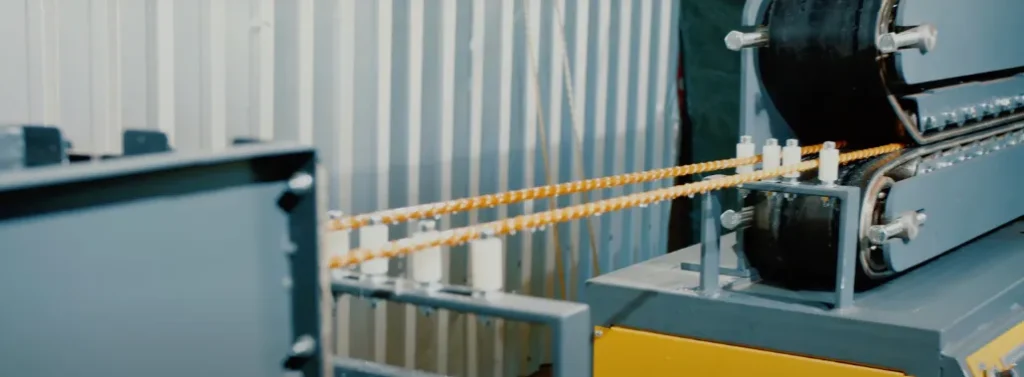Las varillas de refuerzo de PRFV son un material compuesto fabricado con una matriz polimérica reforzada con fibras, generalmente fibra de vidrio en el caso del PRFV. A diferencia de las varillas de refuerzo de acero tradicionales, propensas a la corrosión y la degradación, las varillas de PRFV están diseñadas para resistir los entornos más hostiles, lo que ofrece importantes ventajas para la construcción moderna.
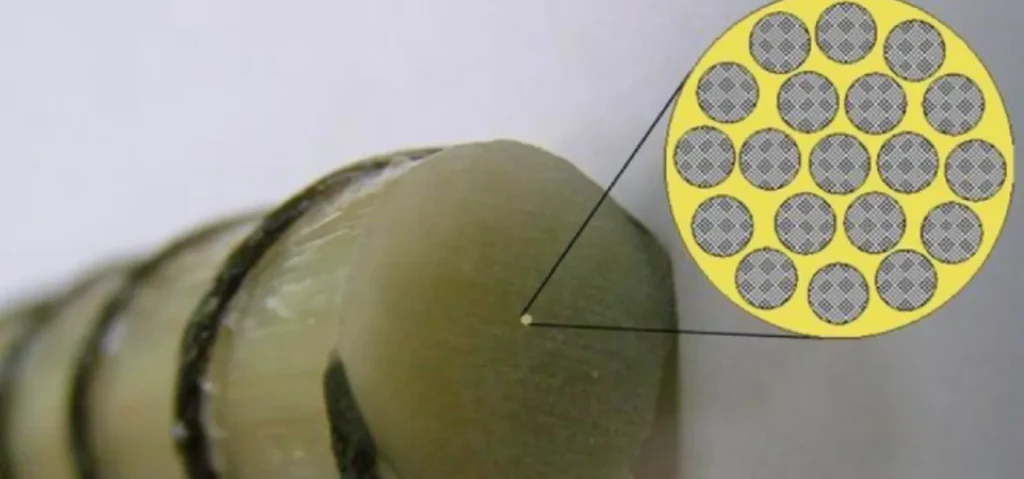
Contenido
Las propiedades clave de las barras de refuerzo de PRFV incluyen:
- Alta resistencia a la tracción:Aproximadamente 1.000 MPa, lo que es 2-3 veces más alto que el acero.
- Resistencia a la corrosión:Inmune al óxido y a la degradación química.
- Ligero:75% más ligero que el acero, lo que reduce los costos de transporte y mano de obra.
- No conductor:Ideal para aplicaciones que requieren neutralidad electromagnética, como hospitales y centrales eléctricas.
El papel de la durabilidad en la longevidad estructural
La durabilidad impacta directamente el ciclo de vida y los costos de mantenimiento de las estructuras. El refuerzo de acero tradicional, si bien es resistente, se corroe con el tiempo, especialmente en entornos expuestos a la humedad, las sales y los productos químicos. Los estudios indican que el refuerzo de acero puede perder hasta un 50% de su resistencia debido a la corrosión en un plazo de 20 a 30 años, lo que requiere costosas reparaciones o reemplazos.
En cambio, las varillas de refuerzo de PRFV ofrecen una vida útil superior a 100 años en entornos corrosivos. Su naturaleza no reactiva garantiza un deterioro mínimo, incluso en condiciones agresivas como estructuras marinas, puentes y plantas químicas. Esta durabilidad se traduce en menores costos de mantenimiento y una mayor vida útil estructural, lo que las convierte en la opción preferida para la construcción sostenible.
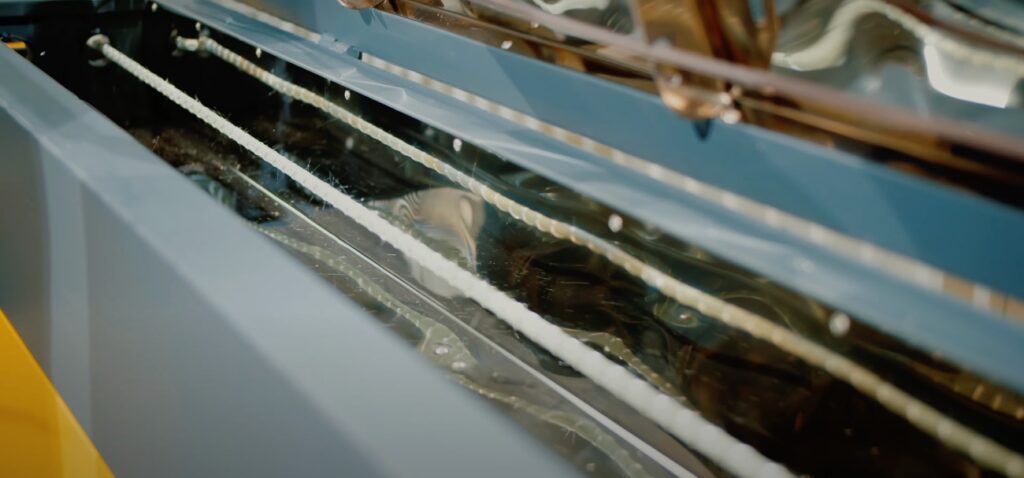
Aplicaciones reales de las varillas de refuerzo de PRFV
1. Estructuras marinas
Los ambientes marinos son altamente corrosivos debido a la exposición constante al agua salada y la humedad. Un estudio realizado en diques reforzados con varillas de PRFV no mostró pérdida de propiedades mecánicas tras 20 años de exposición, a diferencia de los muros reforzados con acero, que requirieron reparaciones importantes.
2. Puentes
El costo de las reparaciones de puentes por corrosión en EE. UU. supera los 1600 millones de dólares anuales. El uso de varillas de refuerzo de PRFV en tableros de puentes, como en los Cayos de Florida, ha demostrado reducir significativamente estos costos. Un ejemplo notable es el puente La Chancelière en Canadá, que se ha reforzado completamente con productos de PRFV, lo que garantiza una vida útil proyectada de 75 años sin necesidad de mantenimiento.
3. Plantas industriales
Las plantas químicas exigen materiales resistentes a entornos ácidos y alcalinos. Los elementos doblados y las varillas de refuerzo de PRFV se han empleado con éxito en estos entornos, demostrando un rendimiento superior al del acero.
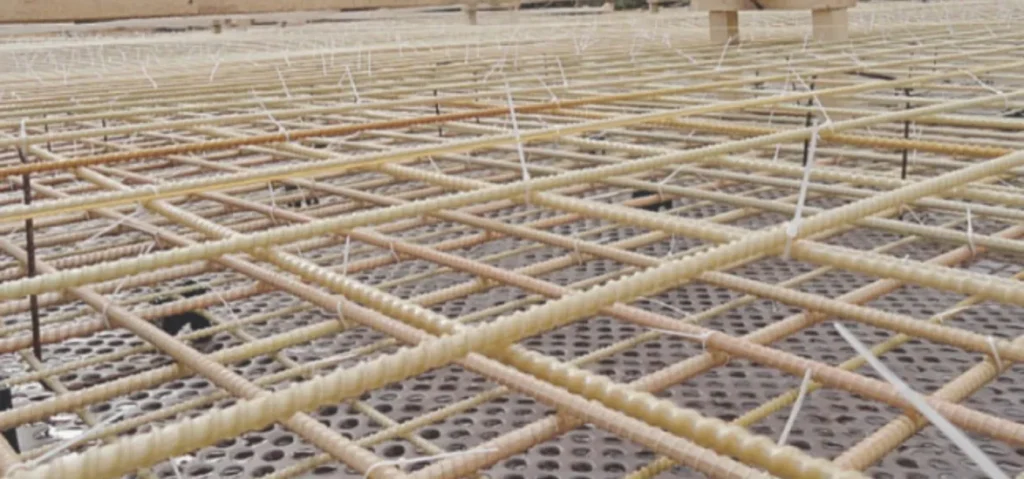
Más información:
Varillas de refuerzo de FRP: áreas de aplicación
Aplicaciones reales de los compuestos de FRP en la construcción de carreteras
Rendimiento comparativo: PRFV vs. varillas de acero
Una comparación directa resalta las ventajas del PRFV sobre el acero:
| Propiedad | varillas de refuerzo de PRFV | varillas de acero corrugado |
| Resistencia a la tracción | 1.000 MPa | 400-600 MPa |
| Resistencia a la corrosión | Excelente (sin óxido) | Pobre (susceptible a la oxidación) |
| Peso | 25% de acero | 100% |
| Conductividad térmica | Bajo | Alto |
| Vida útil | >100 años | 20-30 años |
Esta tabla destaca cómo las barras de refuerzo de PRFV superan al acero en métricas clave críticas para la integridad estructural y la longevidad.
Más información:
Varillas de refuerzo de FRP vs. varillas de refuerzo de acero
Construcción de carreteras: varillas de refuerzo compuestas vs. acero
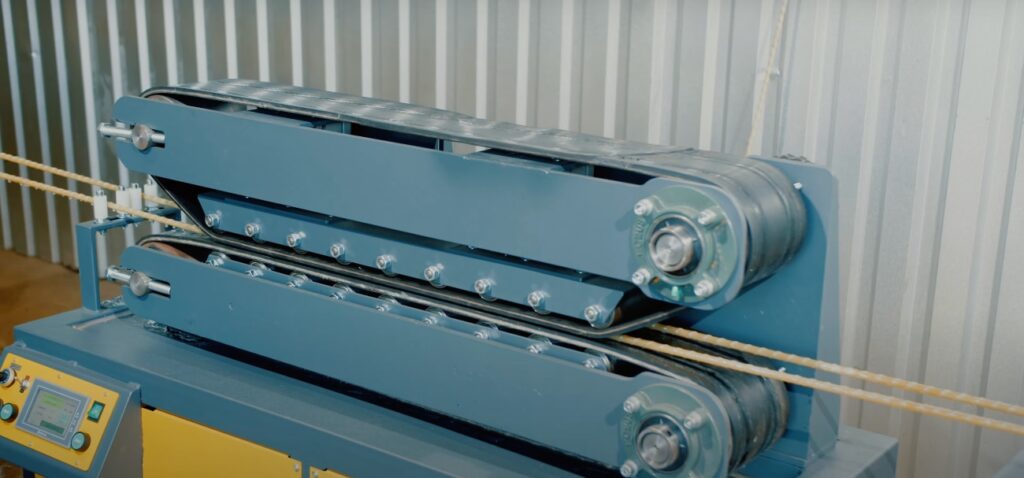
Malla de PRFV y elementos doblados: mayor durabilidad
Además de las varillas de refuerzo, Malla de PRFV y elementos doblados Son esenciales para reforzar diseños estructurales complejos. Estos productos son particularmente útiles en aplicaciones como vigas curvas, fachadas complejas y paneles prefabricados, donde el refuerzo convencional puede resultar insuficiente.
- Malla de PRFVAmpliamente utilizada en pavimentos de carreteras y pisos industriales, la malla GFRP minimiza el agrietamiento y garantiza la durabilidad.
- Elementos doblados de PRFV:Ideales para componentes prefabricados, estos elementos mejoran la resistencia de las uniones y conexiones, garantizando una estabilidad duradera.
El papel de la tecnología compuesta en el avance de las soluciones GFRP
A la vanguardia de esta innovación se encuentra Composite-Tech, líder mundial en la fabricación de equipos para varillas corrugadas de PRFV y máquinas para varillas corrugadas de PRFV. Sus avanzadas líneas de producción garantizan calidad, precisión y escalabilidad constantes.
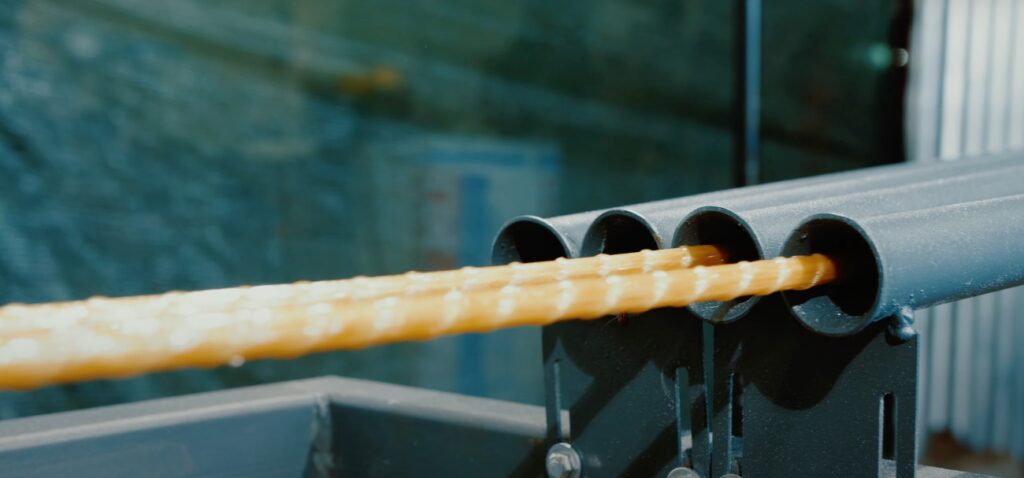
Características principales de los equipos Composite-Tech:
- Alta velocidad de producción con mínimo desperdicio.
- Tamaños y configuraciones de barras de refuerzo personalizables.
- Operación y mantenimiento fáciles de usar.
Al aprovechar la tecnología de vanguardia, Composite-Tech permite la producción de Productos de PRFV que cumplen con estrictos estándares internacionales, contribuyendo a la adopción global de soluciones FRP.
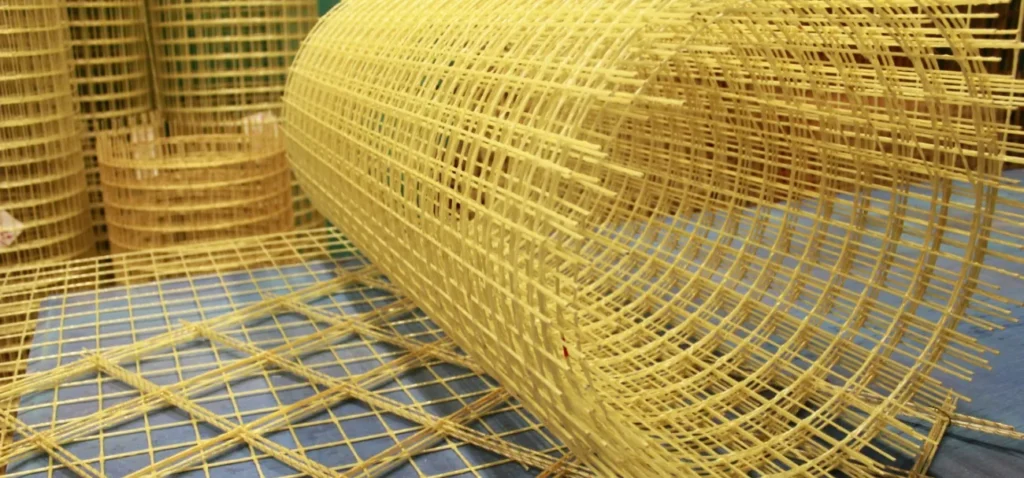
Beneficios ambientales y económicos del PRFV
La durabilidad de las barras de refuerzo de PRFV no solo mejora la longevidad estructural, sino que también se alinea con los objetivos de sostenibilidad:
- Huella de carbono reducidaLos materiales más ligeros reducen las emisiones del transporte. Además, su mayor vida útil reduce el impacto ambiental asociado con las reparaciones y los reemplazos.
- Ahorro económicoAunque el costo inicial de las barras de refuerzo de PRFV es entre 1,5 y 2 veces mayor que el del acero, su costo de ciclo de vida es significativamente menor debido a las menores necesidades de mantenimiento y reparación.
Por ejemplo, un estudio sobre la construcción de puentes encontró que el uso de barras de refuerzo de PRFV ahorró aproximadamente $300 en costos totales durante un período de 50 años, en comparación con los puentes reforzados con acero.
Más información:
Potencial económico de los compuestos de PRFV en la industria vial
Varillas de refuerzo de PRFV en la construcción de carreteras: impacto ambiental
Perspectivas futuras del PRFV en la construcción
Con los avances en la tecnología de fabricación y la creciente conciencia de sus beneficios, mercado global de varillas de refuerzo de PRFV Se proyecta que crecerá a una CAGR de 9,4% entre 2023 y 2030. Se espera que la adopción de GFRP en proyectos de infraestructura, particularmente en regiones con condiciones ambientales agresivas, aumente exponencialmente.
Composite-Tech continúa desempeñando un papel fundamental en este crecimiento al suministrar tecnología de punta. Máquinas de varillas de refuerzo de FRP y Equipo de malla de PRFV, permitiendo a los fabricantes de todo el mundo satisfacer la creciente demanda.
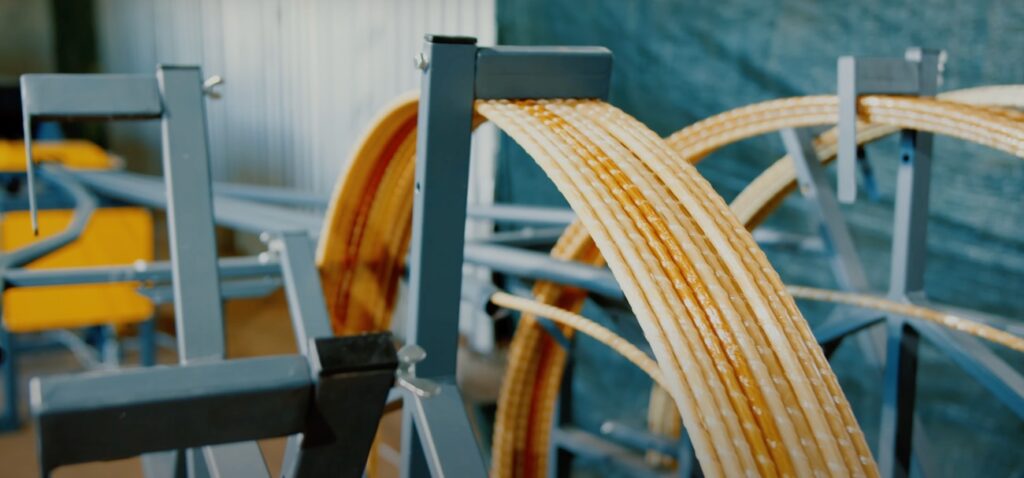
Conclusión
La durabilidad de varillas de refuerzo de PRFV Está revolucionando la industria de la construcción al permitir el desarrollo de estructuras duraderas y de bajo mantenimiento. Su rendimiento superior en entornos hostiles, sumado a sus beneficios económicos y ambientales, lo convierte en un componente vital de la ingeniería moderna.
Al invertir en tecnologías de fabricación avanzadas, empresas como Composite-Tech impulsan la adopción de productos de PRFV a nivel mundial. A medida que la industria avanza hacia prácticas de construcción sostenibles y resilientes, las varillas de refuerzo, las mallas y los elementos doblados de PRFV están llamados a redefinir los estándares de durabilidad estructural.
Para obtener más información sobre Equipos para varillas de refuerzo de PRFV, máquinas de varillas de refuerzo de FRP y otras soluciones innovadoras, visite Sitio web de Composite-Tech hoy y descubre cómo estamos dando forma al futuro de la construcción.

